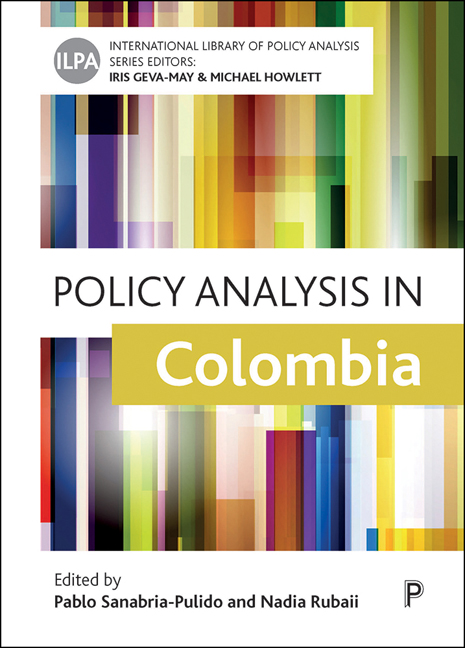Book contents
- Frontmatter
- Dedication
- Contents
- List of Figures and Tables
- List of Abbreviations
- Notes on Contributors
- Editors’ Introduction to the Series
- Policy Analysis in Colombia: An Introduction
- Part One Policy Analysis in Contemporary Colombia
- One The policy Analysis Movement in Colombia: The State of the Art
- Two Evolution of Policy Analysis as a Field of Study and Instruction in Colombia
- Three Policy Analysis, Bureaucratic Capacity and Public Administration Reforms in Colombia
- Part Two Policy Analysis within National and Subnational Governments
- Four Policy Analysis Inside Central Government in Colombia
- Five Policy Analysis and the Legislature in Colombia
- Six Policy Analysis in the Colombian Constitutional Court
- Seven Metropolitan Governance and Policy Analysis in Colombia
- Eight Policy Analysis for Decision Making in Colombian Local Governments
- Part Three Policy Analysis in Key Policy Domains
- Nine Policy Analysis in the Education Sector in Colombia
- Ten Policy Analysis in the Health Sector in Colombia
- Eleven Policy Analysis and Decision Making in the Military Forces: The Havana Experience
- Twelve Technocracy, Decision Making and Economic Policy in Colombia
- Thirteen Social Policy, Target Populations and Policy Analysis in Colombia
- Part Four Policy Analysis Beyond the State
- Fourteen Political Parties and Policy Analysis in Colombia
- Fifteen Policy Analysis and NGOs in Colombia
- Sixteen Media, Evidence and Policy Analysis in Colombia
- Conclusion: Building Capacity for Policy Analysis Amid Tensions and Challenges in Colombia
- Index
Four - Policy Analysis Inside Central Government in Colombia
Published online by Cambridge University Press: 10 March 2021
- Frontmatter
- Dedication
- Contents
- List of Figures and Tables
- List of Abbreviations
- Notes on Contributors
- Editors’ Introduction to the Series
- Policy Analysis in Colombia: An Introduction
- Part One Policy Analysis in Contemporary Colombia
- One The policy Analysis Movement in Colombia: The State of the Art
- Two Evolution of Policy Analysis as a Field of Study and Instruction in Colombia
- Three Policy Analysis, Bureaucratic Capacity and Public Administration Reforms in Colombia
- Part Two Policy Analysis within National and Subnational Governments
- Four Policy Analysis Inside Central Government in Colombia
- Five Policy Analysis and the Legislature in Colombia
- Six Policy Analysis in the Colombian Constitutional Court
- Seven Metropolitan Governance and Policy Analysis in Colombia
- Eight Policy Analysis for Decision Making in Colombian Local Governments
- Part Three Policy Analysis in Key Policy Domains
- Nine Policy Analysis in the Education Sector in Colombia
- Ten Policy Analysis in the Health Sector in Colombia
- Eleven Policy Analysis and Decision Making in the Military Forces: The Havana Experience
- Twelve Technocracy, Decision Making and Economic Policy in Colombia
- Thirteen Social Policy, Target Populations and Policy Analysis in Colombia
- Part Four Policy Analysis Beyond the State
- Fourteen Political Parties and Policy Analysis in Colombia
- Fifteen Policy Analysis and NGOs in Colombia
- Sixteen Media, Evidence and Policy Analysis in Colombia
- Conclusion: Building Capacity for Policy Analysis Amid Tensions and Challenges in Colombia
- Index
Summary
Introduction
Colombia is a unitary republic, decentralized, with autonomy of its territorial entities. The government is composed of three distinct branches – executive, legislative and judicial – whose powers and duties are vested by the Colombian Constitution. The President and Congress are elected in separate time frames, and for fixed terms, directly by the primary voters. The President is the main public policy agenda setter. He and his cabinet are responsible for defining both the government's priorities as well as the necessary resources to target them, which are laid down through a policy-making process (Mejia-Guinand and Botero, 2018a). This is a procedure that mobilizes both the technocratic resources of the executive, and various political forces of the country. The procedure materializes in the approval of the PND, a technical document that transforms the policy promises made by the President when running for office, into concrete policy goals and investment objectives for his four-year term in office. This framework has been consistent since the enactment of the 1991 Colombian Constitution.
This chapter describes the policy-making process of the Colombian central government. It aims to identify the role of policy analysis in all the stages of the policy cycle, namely planning, budgeting, execution, monitoring and evaluation. For each of these stages, the chapter presents the efforts of the government to develop comprehensive tools to produce useful information for policy decision making. These tools exist and are broadly used; however, the chapter also looks at the institutional restrictions, political factors or lack of incentives in the use of information that constrain the capacity of policy analysis by the central government.
In addition to this introduction, the chapter is organized in the following way. The first section presents the key political actors that participate in Colombia's central government public policy making process. The second section explains how policies are planned, prioritized, budgeted, implemented and evaluated in Colombia, and the third section introduces the political forces that shape the policy-making process and how such actions affect the policy analysis. Last section concludes the chapter.
- Type
- Chapter
- Information
- Policy Analysis in Colombia , pp. 65 - 80Publisher: Bristol University PressPrint publication year: 2020



